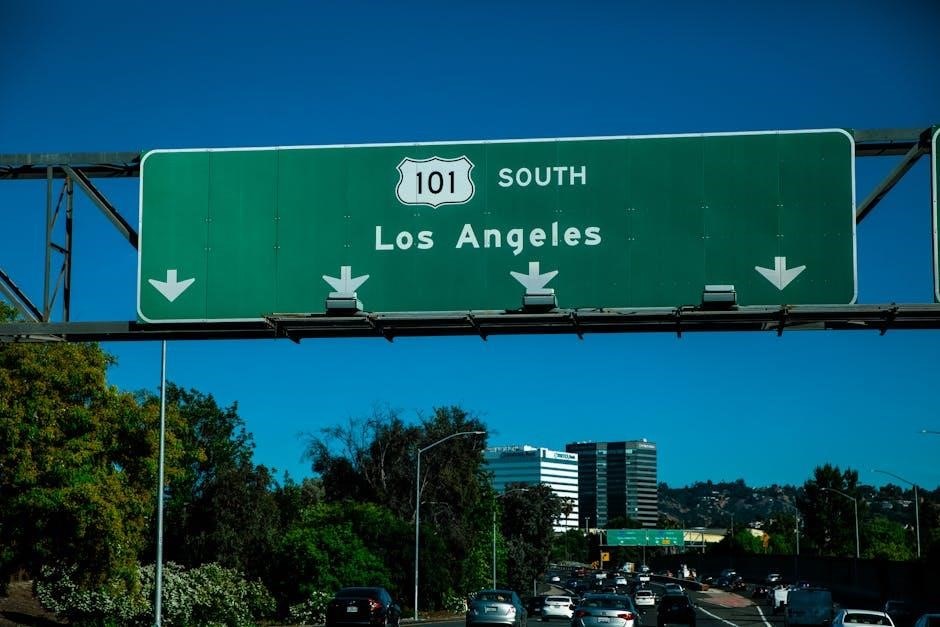The 20-Day Preliminary Notice is a legal requirement under California Civil Code‚ ensuring transparency in construction projects․ It applies to both private and public works‚ serving as a preliminary step to protect payment rights for contractors‚ subcontractors‚ and suppliers․ This notice is not a lien but a crucial precursor to potential lien filings‚ emphasizing timely communication and compliance with state regulations․
1․1 Purpose of the Preliminary Notice
The purpose of the 20-Day Preliminary Notice is to inform property owners‚ lenders‚ and other stakeholders of potential lien rights․ It ensures transparency and provides an opportunity to address payment issues early․ This notice is a proactive step to protect the rights of contractors‚ subcontractors‚ and suppliers‚ ensuring compliance with California lien laws and facilitating smoother project management and payment processes․
1․2 Legal Requirements Under California Civil Code
The 20-Day Preliminary Notice is mandated by California Civil Code sections 8100 et seq․ and 9300․ It must be served within 20 days of first furnishing labor or materials․ The notice requires specific details‚ including project information‚ services provided‚ and the recipient’s name․ Proper delivery and recording are essential for compliance‚ ensuring the right to file a mechanic’s lien if payment disputes arise․
Who Needs to Send the 20-Day Preliminary Notice?
Contractors‚ subcontractors‚ material suppliers‚ and equipment lessors must send the 20-Day Preliminary Notice to protect their payment rights under California lien laws․ Other parties involved in construction projects may also be required to comply with this legal requirement to ensure timely payment and maintain their lien rights․
2․1 Contractors and Subcontractors
Contractors and subcontractors must send the 20-Day Preliminary Notice to protect their rights under California lien laws․ This ensures compliance with legal requirements and maintains their ability to file a lien if payments are withheld․ The notice applies to both direct contractors and subcontractors involved in private or public works‚ emphasizing the importance of timely filing to preserve payment rights and avoid potential disputes․ Missing the deadline can result in loss of lien rights․
2․2 Material Suppliers and Equipment Lessors
Material suppliers and equipment lessors are also required to send the 20-Day Preliminary Notice in California․ This ensures they maintain their rights under state lien laws‚ even if they are not directly contracted with the property owner․ Their contributions‚ such as providing materials or leasing equipment‚ are essential to project completion‚ and the notice safeguards their payment rights․ Compliance is crucial for all parties involved in the construction supply chain to avoid disputes and ensure timely compensation․ This requirement underscores their vital role in the project’s success․
2․3 Other Parties Involved in Construction Projects
Other parties‚ such as architects‚ engineers‚ and laborers‚ may also need to send the 20-Day Preliminary Notice․ This includes anyone who furnishes labor or materials but is not directly contracted with the property owner․ Their contributions are vital to project execution‚ and the notice ensures their rights are protected under California lien laws․ This requirement applies broadly to maintain fairness and transparency in the construction process for all participants․ Compliance is essential to safeguard payment rights and avoid potential disputes․

The Process of Sending the Preliminary Notice
The process involves preparing the notice‚ delivering it to the property owner‚ and recording it․ Timely and accurate filing ensures compliance with California Civil Code requirements․
3․1 Preparing the Notice
Preparing the 20-Day Preliminary Notice requires precise details‚ including project specifics‚ parties involved‚ and a description of labor or materials furnished․ Use the official California template to ensure compliance with Civil Code sections․ Include the property owner’s information‚ a clear statement of work‚ and the required legal language․ Accuracy is crucial to avoid disputes and maintain lien rights․ Professional templates are available online for proper formatting and content․
3․2 Delivering the Notice to the Property Owner
Delivery of the 20-Day Preliminary Notice must be made to the property owner within the required timeline․ Certified mail‚ personal delivery‚ or overnight courier are accepted methods․ Ensure proof of delivery is obtained‚ as this serves as evidence of compliance․ The owner’s address should match the one listed in the building permit or county records․ Proper service is critical to maintain lien rights and avoid potential disputes․ Timely and accurate delivery is essential․
3․3 Recording the Notice
After delivering the Preliminary Notice to the property owner‚ it must be recorded with the county recorder’s office․ This step ensures the notice becomes part of the public record‚ providing formal notice to all interested parties․ Recording typically occurs within the same timeframe as delivery and is essential for preserving lien rights․ Proper documentation of the recording date and method is crucial for compliance and potential future disputes․

Key Timing Requirements
The 20-Day Preliminary Notice must be recorded within the same timeframe as delivery‚ ensuring compliance and preserving lien rights․ Missing this deadline can result in lost rights․
4․1 The 20-Day Deadline
The 20-Day Preliminary Notice must be delivered within 20 days of first furnishing labor or materials․ This strict deadline ensures timely notification to property owners and other stakeholders․ Failure to meet this deadline can result in the loss of lien rights‚ emphasizing the importance of prompt action․ The deadline applies to contractors‚ subcontractors‚ and suppliers‚ ensuring all parties are aware of their rights and obligations in California construction projects․
4․2 Exceptions and Special Cases
While the 20-day deadline is standard‚ exceptions exist․ Public works projects may have different requirements‚ and direct contracts with property owners can affect the notice period․ Emergency services or urgent repairs often fall under special cases‚ where the deadline may be waived or adjusted․ Understanding these exceptions is crucial to ensure compliance and avoid potential disputes in California construction projects․

Consequences of Missing the Deadline
Missing the 20-day deadline severely limits your ability to file a mechanics lien‚ jeopardizing payment security and potentially leading to financial losses on construction projects in California․
5․1 Impact on Lien Rights
Failing to serve the 20-Day Preliminary Notice in California can significantly impair lien rights․ Without this notice‚ parties may lose their ability to file a mechanics lien‚ which is a critical tool for ensuring payment․ This oversight can leave contractors‚ subcontractors‚ and suppliers vulnerable to non-payment‚ as the lien process is a key safeguard under California law to secure compensation for work performed or materials supplied․ Timely compliance is essential to preserve these rights and avoid financial risk․
5․2 Potential Disputes and Delays
Missing the 20-Day Preliminary Notice deadline can lead to payment disputes and project delays․ Without proper notice‚ property owners or general contractors may dispute liability for unpaid work or materials‚ causing friction among stakeholders․ This can delay resolutions‚ extend project timelines‚ and increase costs․ Such issues often arise from misunderstandings or lack of documentation‚ emphasizing the importance of timely and accurate notice filing to maintain smooth project operations and relationships․
Sample 20-Day Preliminary Notice PDF
A sample 20-Day Preliminary Notice PDF is available online‚ providing a template for compliance with California Civil Code requirements․ It outlines the necessary structure and content‚ ensuring clarity and adherence to legal standards․ This resource is invaluable for contractors‚ subcontractors‚ and suppliers to maintain proper documentation and avoid disputes․
6․1 Structure and Content of the Form
The 20-Day Preliminary Notice form typically includes project details‚ such as the property owner’s name‚ project location‚ and a description of the work or materials provided․ It also outlines the legal requirements under California Civil Code and serves as a formal notification to the property owner․ The form must be clear‚ concise‚ and properly formatted to ensure compliance with state regulations․ Proper completion is essential for maintaining payment rights and avoiding disputes․
6․2 Where to Find the Official Template
The California Department of General Services or Construction Notice Services provides the official 20-Day Preliminary Notice template․ You can download it from their websites or access it through legal document providers․ Ensure you use the most recent version to comply with California Civil Code requirements․ Professional services may also assist in obtaining and completing the form accurately․
Benefits of Sending the Preliminary Notice
Sending the 20-Day Preliminary Notice protects lien rights‚ ensures timely payment‚ and maintains clear communication‚ helping avoid disputes and ensuring compliance with California law․
7․1 Protecting Lien Rights
The 20-Day Preliminary Notice is essential for protecting lien rights in California․ It ensures that contractors‚ subcontractors‚ and suppliers can secure their right to file a mechanic’s lien if payment issues arise․ Failing to send this notice on time can result in the loss of lien rights‚ even if the work is completed or materials are supplied․ This notice serves as a foundational step to safeguard payment rights and avoid potential disputes․
7․2 Ensuring Timely Payment
The 20-Day Preliminary Notice plays a crucial role in ensuring timely payment by formally communicating project details to property owners․ This notice highlights the parties involved and their rights‚ encouraging owners to address payment issues promptly․ By establishing clear expectations‚ it helps prevent delays and ensures that contractors and suppliers receive compensation for their work or materials in a timely manner‚ maintaining smooth project cash flow․

Common Mistakes to Avoid
Common mistakes include oversight in detailing labor‚ materials‚ or services‚ and failing to verify recipient addresses․ Professional services can help prevent these errors‚ ensuring compliance and accuracy․
8․1 Incorrect or Incomplete Information
One of the most frequent errors is providing inaccurate or incomplete details in the preliminary notice‚ such as incorrect project descriptions‚ wrong party information‚ or missing service specifics․ This can lead to delays in payment or even the loss of lien rights․ Ensuring all information is accurate and complete is crucial to maintaining compliance and avoiding potential disputes or financial repercussions down the line․ Professional review can help mitigate such risks effectively․
8․2 Failure to Deliver on Time
Missing the 20-day deadline for delivering the preliminary notice is a critical mistake․ California law mandates strict adherence to this timeline‚ and late delivery can result in the loss of lien rights‚ delaying payments and creating project disputes․ Timely delivery ensures all parties are informed and maintains the contractor’s ability to secure payment‚ highlighting the importance of careful scheduling and compliance with legal requirements to avoid such issues․ Proper planning and professional assistance can prevent this common oversight․
Best Practices for Compliance
Engage professional services for timely delivery and accuracy․ Double-check all details to avoid errors‚ ensuring compliance with California’s 20-Day Preliminary Notice requirements and preventing potential disputes․
9․1 Using Professional Services
Hiring experienced professionals ensures compliance with California’s 20-Day Preliminary Notice requirements․ Experts handle preparation‚ delivery‚ and recording‚ minimizing errors and ensuring timely submission․ Their knowledge of legal nuances guarantees accuracy‚ protecting lien rights and avoiding disputes․ Professional services are particularly beneficial for complex projects or when dealing with multiple stakeholders‚ as they streamline the process and reduce the risk of non-compliance․
This approach saves time and ensures all details are correctly addressed‚ fostering a smooth construction payment process․
9․2 Double-Checking All Details
Thoroughly reviewing every aspect of the preliminary notice ensures accuracy and compliance․ Verify project details‚ payment terms‚ and deadlines to prevent errors․ Double-checking helps avoid issues like missed deadlines or incorrect information‚ which can lead to loss of lien rights or payment delays․ This step is crucial for maintaining smooth communication and ensuring all parties are aligned‚ preventing potential disputes and ensuring timely payment processing․
